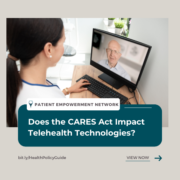Does the CARES Act Impact Telehealth Technologies?
Does the CARES Act Impact Telehealth Technologies? from Patient Empowerment Network on Vimeo.
Joe Kvedar, MD from the American Telemedicine Association shares how the CARES Act has impacted telehealth technologies and what the expiration of the CARES Act means for patients.
See More from the Health Policy Activity Guide
Transcript
Mary Leer:
How does the CARES Act impact telehealth technologies?
Joe Kvedar:
Well, so this gets back to whether we can do these sort of, any software story now, and it’s really, I think it officially still says in the law that you can use, again, Google Meets, you can use FaceTime, you can use whatever you want. But in practicality, the good news is that the industry has really responded in a way that allows us as clinicians to offer our patients a secure solution almost always, and so most of the medical record vendors have integrated a video conferencing tool into their suite. We use Epic where I work, and ZOOM is integrated into Epic, so that I can launch a call from Epic, the patient can request a video call from our patient portal, and it’s all done securely, but even for those doctors who don’t have that kind of fancy software, there’s a tool called Doximity, which is a social network fundamentally for doctors, and it’s free and Doximity has something within it called a dialer function, and what it allows you to do is place a video call. It’s very patient-friendly and it is secure. So really the need for us to use some of these other tools that are less secure has gone away now, and I think anyone that’s doing this kind of work should be using tools that are secure, of course, for the good of our patients as well.
Mary Leer:
Wow, that’s very reassuring. Did the CARES Act expire? If so, when and why?
Joe Kvedar:
Well, a lot of the provisions went away last December, the CARES Act was a broad set of policy changes having to do with the virus, but the good news… We’re talking about telehealth. The good news is that all of the telehealth provisions are still in place, and the government just passed a few weeks ago, an omnibus spending bill, and within that omnibus spending bill was a large section of legislation around how we’re handling telehealth, at least in the first few months, after the public health emergency expires. So, the reason for the CARES Act was because there was a public health emergency and right now, we’re still in the public health emergency and it gets renewed every 90 days. The government has said to us that they’ll give us a 60-day notice if they’re not going to remit, they just renewed April 1st through April, May and June. So, the next time it comes up will be July 1, so in early May, if they’re not going to renew it, we will know, and the rule or the law that just was passed in the omnibus spending bill extends all of those telehealth regulations that we talked about earlier.
Extends the reimbursement, extends the technology provisions through 100, it’s a weird thing, but 150 days after the public health emergency is lifted. So, we think optimistically that gives us to at least the end of this calendar year to figure out and convince Congress to do something that has more longevity to it. Their two main concerns are number one, cost, they feel like possibly telehealth is going to add so much to Medicare that it will be a drain on the trust fund, I’m being a little bit hyperbolic, but there is worry, and I think as providers we need to reassure them that we’re not adding services, but substituting for in-office services. In fact, it should be cheaper, but anyway, they’re worried about cost. The second thing though that is even harder to convince them is not a problem, is fraud and abuse, somehow people have this sense that because it’s electronic, it’s easier for people to commit fraud, it’s no easier than… And there’s a lot of, unfortunately, fraud that goes on in Medicare and office-based practices as well, so we’re battling them on that one, but that’s what they want to do, steady for five months after the public health emergency is lifted and come up with a longer-term solution.
So we consider that a victory. As I said, the public health emergency may not be lifted in July, we don’t know yet, but if it is, we still have a good six months to figure out how to extend as much of this relaxed regulatory environment run telehealth as we can.
If we do in fact run out of runway to do this, it will be like going back into the ice age right now, are patients… I have to say this is, I’ve been at this almost 30 years, and when I go to the physical office and see patients, and I had mentioned to them, we could do your follow-up by telehealth, and they nod their head, they know what I’m talking about. That’s an amazing thing for me. I used to have to explain what it was, how to do it, etcetera. There’s like, no problem, we get it. So patients are now used to this and it’s a good thing, and we as I think somewhere… I don’t know whether it’s 5% of claims now, but I don’t know how much of healthcare is delivered this way, but a substantial amount, and so we risk that going away is the big risk, why is that? Because if Medicare does not get… Well, it’s called the Originating Site Rule Change, and that was given up during the pandemic, it was part of the care regulations that Medicare, as a Medicare recipient, you can be in your home and receive telehealth, you can be in an urban environment and receive telehealth. Before the pandemic, you had to live in a rural area, a very, very tight geographic restriction, and you had to go to a facility, so it was much more regulated and therefore there was much less activity.
That’s the big one for us. There’s a few other things like federally qualified health centers, being able to use telehealth, very important, but the big one for us is this idea that if we don’t change the law to allow what’s called the originating site to be the patient’s home, then it could very well be in high siege, unfortunately, because the other thing that we should probably note is that if Medicare makes a payment decision, this is just generally, doesn’t have to be telehealth, but if Medicare makes a payment decision, most private payers will follow suit. So if Medicare makes a decision to continue to reimburse telehealth, you’ll find most private payers will feel compelled to do that if Medicare makes a decision. Well, and again, it’s Congress because it’s a law. So, if Congress doesn’t pass a new law, then we’ll find that Medicare has to go back to that very restrictive, geographic limited way and the private payers will say, oh great, we don’t have to pay for this. We’ll go back to our old ways. So that’s why I call an ice age, and where I am Chairman of the Board at the ATA, we’re working very hard to make sure that doesn’t happen.










